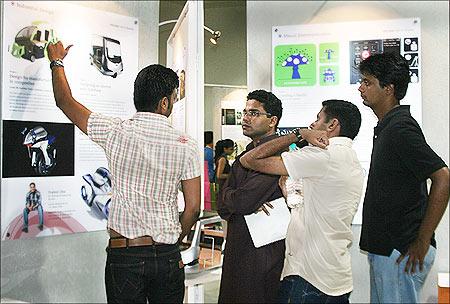
'I wouldn't be surprised if in a few years, students sitting in Mumbai, Rajasthan ... earn higher education degrees without leaving their homeland.'
Indians abroad discuss the challenges faced by India's higher education system and offer solutions as Rediff.com contributor Simanta Roy listens in.
"I came to the US for higher education eight years back, and I still cannot explain to my parents what I do for a living," Rahul Choudaha, director, research and strategic development, World Education Services in New York, said at a panel discussing the challenges faced by the current Indian higher education system.
"With all due respect to people who are already working in higher education in India, that is not a sector where talent goes by choice," Choudaha went on. "People want to be engineers, MBA (graduates), lawyers..."
It was this school of thought with which Choudaha began his career as an engineer, subsequently earned his MBA, and then went into information technology.
"And then I thought, what a waste -- I want to be in education," he said.
Choudaha, who now advises students on higher education strategies and blogs at DrEducation.com, advocated for transparency in a system with 20 million students -- the third largest higher education population in the world.
He called for a central database where institutions should disclose how they are doing on various parameters -- curricula, accessibility, enrollment figures, and employment rates -- which would benefit policy makers, students, and employers alike.
Madhukar Gupta, divisional commissioner, Jaipur, lamented the stagnancy of the higher education curricula, which challenged a graduate’s employability, and the lack of vocational training: "We've had the same old curricula -- not demand-driven -- (for) the last 50, 60 years."
He also pointed to the benefits of collaborating internationally and letting foreign universities in, asking, "How many of us can go to other countries?" This, he said, would diversify the system and maybe stop the study of humanities from being neglected in India.
Harry Aurora, founder and chief executive officer, of iTutor Inc, an online platform of certified educators available to tutor at affordable prices, spoke optimistically of the Internet remedying some of India's higher education issues.
"I wouldn't be surprised if in a few years, students sitting in Mumbai, Rajasthan ... (begin) earning higher education degrees without leaving their homeland," he said.
Radhika Gorur, research fellow, Victoria Institute, Australia, whose current research focuses on contemporary education policy, said that the growth of Massive Open Online Courses was inevitable, but questioned the accessibility of those courses.
She agreed that Indian institutions needed to start recognising course credits from both foreign and neighbouring universities.
She outlined the sector's main challenge to be the lack of a unitary system: "We have the state system... the central system... the public system... the private system... universities and college... It's a very, very complex space, which makes governing that space very, very difficult."
However, she highlighted the phenomenon of jagas -- literally meaning 'spaces' -- cropping up in India for co-learning, spaces where students gather, access MOOCs, and discuss lessons.
Though the country's sheer size made tackling these issues a challenge, she said small local solutions had begun: "The beautiful thing about India is that things don't work in theory, but actually find ways to work in practice."